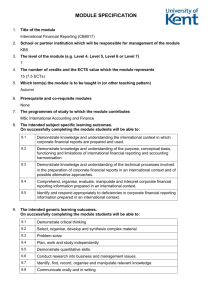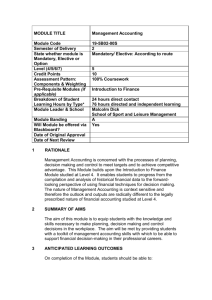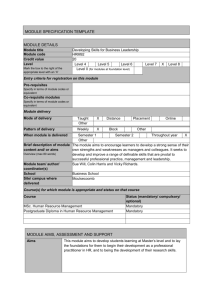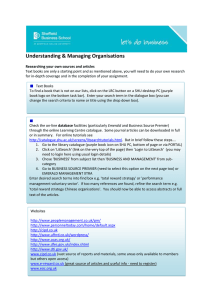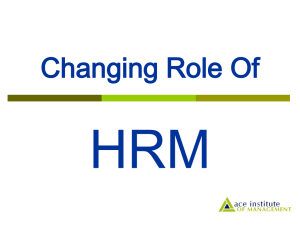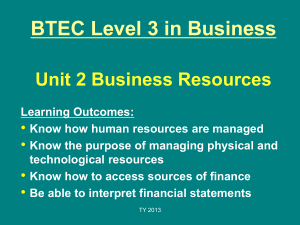BUS506
advertisement
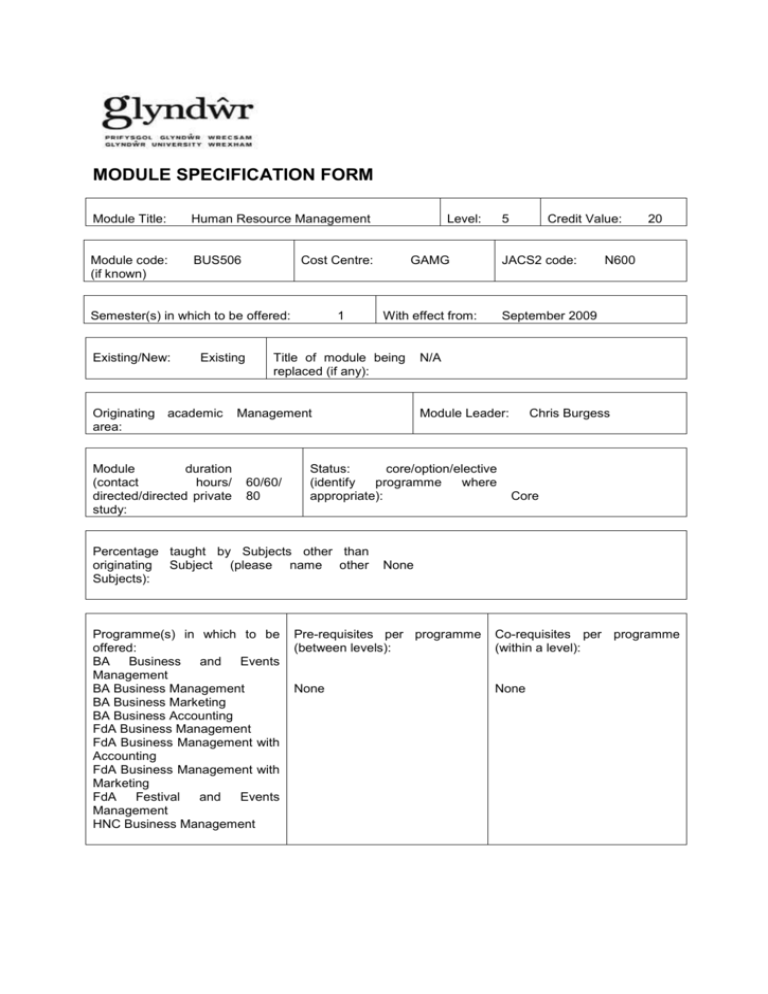
MODULE SPECIFICATION FORM Module Title: Human Resource Management Module code: (if known) BUS506 Cost Centre: Semester(s) in which to be offered: Existing/New: Existing Originating academic area: Module duration (contact hours/ directed/directed private study: Level: 1 GAMG Management Programme(s) in which to be offered: BA Business and Events Management BA Business Management BA Business Marketing BA Business Accounting FdA Business Management FdA Business Management with Accounting FdA Business Management with Marketing FdA Festival and Events Management HNC Business Management 20 N600 September 2009 N/A Module Leader: Status: core/option/elective (identify programme where appropriate): Percentage taught by Subjects other than originating Subject (please name other Subjects): Credit Value: JACS2 code: With effect from: Title of module being replaced (if any): 60/60/ 80 5 Chris Burgess Core None Pre-requisites per programme (between levels): Co-requisites per programme (within a level): None None Module Aims: The module aims to introduce students to the role, perspectives, functions, activities and skills associated with Human Resource Management in contemporary organisations , operating an a changing global context; and to enable them to critically review HRM in practice within their vocational areas and/or organisations Expected Learning Outcomes At the end of this module, students should have : Knowledge and Understanding of : 1. Recognise the variety of HRM approaches and differentiate their application in varying organisational contexts 2. Identify the role, responsibilities and functions of human resource management, and evaluate the challenges that human resources managers face in contemporary organisations Transferable/Key Skills and other attributes: 1. 2. 3. 4. 5. 6. Oral, written and visual communication and presentations skills Self-management skills in terms of time, planning, self –starting and independent learning Interpersonal skills of effective listening, negotiating, persuasion and presentation Performance, within a team environment in Information gathering , evaluation and application problem solving skills, such as identifying, formulating and solving business problems Assessment: please indicate the type(s) of assessment (eg examination, oral, coursework, project) and the weighting of each (%). Details of indicative assessment tasks must be included. Formative activities encourage students to evaluate their learning and apply it in context. Assessment 1: Group or individual activity: investigation of role and approach of HRM within a chosen organisation. Formal presentation or poster presentations, plus (individual) briefing sheet. Assessment 2: Research, analysis and evaluation of organisation’s HR activities in the light of ‘best practice’. Alternative activity: case study analysis Assessment Number Learning Outcomes be met LO 1 & 2 Assessment 1 LO2 Assessment 2 Type of assessment Weighting Group or individual activity: investigation of role and approach of HRM within a chosen organisation. Formal presentation or poster presentations, plus (individual) briefing sheet. Research, analysis and evaluation of organisation’s HR activities in the light of ‘best practice’. Alternative activity: case study analysis 50% Word count or equivalent if appropriate 2,000 50% 2,000 to Duration (if exam) Learning and Teaching Strategies: This is built on the learning and teaching strategy the School and adopts lectures for delivery of key concepts in the course, followed by activity based tutorials which encourage students to engage with concepts, to develop understanding in more depth, to develop skills and share learning with colleagues. Case studies, exercises, videos, activities and discussions and assessment workshops will be used as appropriate to involve students in appraisal of ideas and the application of theory in practical contexts. Formative support provided in assessment workshops provides discussion, guidance and feedback on assignment tasks and activities. Private study is encouraged during which students may consolidate learning, undertake research for assessments and work with peers to complete group activities. The focus of study is on wider reading to develop and reinforce knowledge and understanding of the topics and material covered in lectures, preparation for tutorials and work towards assessments. It can also help students to develop time management skills, library skills and critical thinking. Power point slides are available via the VLE, as are a number of additional sources of support and information. Syllabus outline: The role of human resource management in a changing world. Human resource planning and resourcing, Recruitment, selection, Remuneration and reward Learning, training and development Managing and developing performance Equal opportunities and managing diversity Discipline, grievance Termination and exit Contemporary issues and new developments: e.g, employment costs; changes in working roles and career progression, globalisation and international human resource management, corporate social responsibility, human capital, virtualisation Bibliography Essential reading one from: Bloisi, W. (2007) An Introduction to Human Resource Management London: McGraw Hill Foot, M. and Hook, C (2008) Introducing Human Resource Management (5 ed) Harlow: Financial Times Prentice Hall Stredwick, J. (2005) An Introduction to Human Resource Management (2 ed) London: Elsevier Torrington, D, Hall, L, Taylor, S and Atkinson, C. (2009) Fundamentals of Human Resource Management , Harlow: Financial Times Prentice Hall Other indicative reading: Armstrong, M. ( 2006) A Handbook of Human Resource Management Practice (10 Edn) London: Kogan Page Beardwell, J and Claydon, T ( 2007) Human Resource Management : A Contemporary Approach (5 Edn) Harlow: Financial Times Prentice Hall Bratton, J and Gold, J (2007) Human Resource Management, Basingstoke: Palgrave Macmillan Marchington, M. and Wilkinson, A. (2008) Human Resource Management at Work (4 Edn) : People Management and Development Torrington, D., Hall, L. and Taylor, S. (2008) Human Resource Management Harlow: Financial Times Prentice Hall People Management www.peoplemanagement.co.uk Personnel Today Human Resource Management Journal ACAS.org.uk CIPD.co.uk Xpert HR

